 |
Home | Search | Browse | About IPO | Staff | Links |
 |
Home | Search | Browse | About IPO | Staff | Links |
|
Women in Illinois government the power and the promise 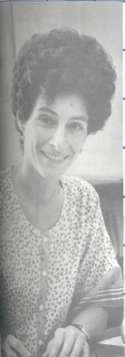 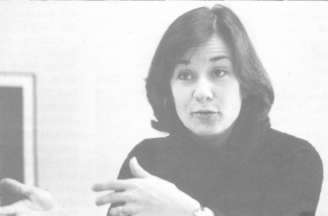 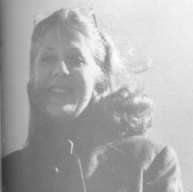 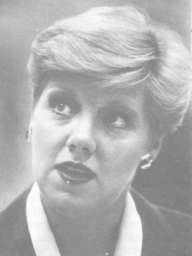 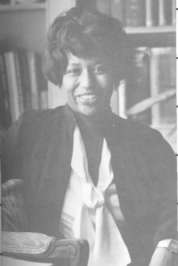 By MARCIA STEPANEK A growing number of women are taking key roles at the helm — and at the stern — of state government and politics. Yet contrary to popular belief, the number of women in top state government spots has increased only slightly in the past decade. We chose six, essentially unsung women we thought may surface as potent political forces in their own right during the decade — whether they stay in the public arena or take jobs in the private sector. We skipped — with the exception of state Sen. Dawn Clark Netsch — the headline favorites like Chicago Mayor Jane M. Byrne. We also tried to represent a cross-section of state government, and chose a political strategist, an agency division chief and a state senator with her eye on the governor's chair. These are women, who, through talent, perspicacity and sometimes serendipity are succeeding in the still male-dominated Illinois government and political arenas. These are their stories. Carol Moseley Braun SOME CALL IT luck; others label it sheer determination. Whatever Carol Moseley Braun has, it has given her quite a knack for overcoming the odds. Braun, 33, grew up on Chicago's economically depressed south side, was bused out of a racially mixed neighborhood to attend a segregated high school on the opposite end of the city, and was graduated from high school with honors but without the educational skills needed to make it through her first year at the University of Illinois. She dropped out of the U of I after six months and took an $800-per-month job as a group leader for a special program for inner-city children at the Chicago Housing Authority. She cites the optimism and courage of University of Chicago Special Programs Director Larry Hawkins for her decision to return to school and rise above her socially bleak environment. She has bucked racial barriers in her marriage and her career — and cites them as incentives for her successful bid to the Illinois House in 1978. January 1981 /Illinois Issues/23 In Springfield, she has locked horns with some of the toughest and loudest in bitter battles over human rights, public aid and affirmative action. She has emerged — as she has throughout her life — a survivor. In law school at the University of Chicago, Carol met and married Michael Braun, a lawyer; and her legal career had a solid beginning with an appointment as assistant U.S. attorney in the northern district of Illinois, handling civil litigation. In 1977, she stopped working to give birth to a son, Matthew, and shortly afterwards she entered politics. When former Rep. Robert Mann, one of the House's most staunch veteran liberals, announced his retirement from the House, Braun was asked to consider running for his seat. "At first, I said no because I didn't have the political experience and the political connections I thought I needed," she said. "Then, a set of coincidences propelled me into getting into the race. A group of people approached me and asked me not to run. They said I'd just foul things up for independents in my [24th] district because they said white people would not vote for a black independent and black people tend to vote straight Democratic. I thought this was so much malarkey — particularly in a diverse and intellectual district like mine — that I got so angry and decided, that's it, I was going to run." Braun said her husband also was part of the problem. "My husband is white and so the politics of race also came into the picture," she said. "But I maintained and still do that if you scratch beneath the surface a little, you can find surprising things, like people voting their own interests regardless of more surface-oriented concerns. I came out first in my race for the House." Once in Springfield, Braun quickly established herself as one of a new breed of female and black legislators — and was one of few freshman representatives who wasn't afraid to speak up or take on controversy in her first term. She became a member of the House Appropriations Committee and of the House Human Resources Committee. And once more, Braun was an exception. For two consecutive years, she was able to push out of the House with some difficulty controversial cost-of-living increases for welfare recipients despite vehement objections of colleagues on both sides of the aisle. 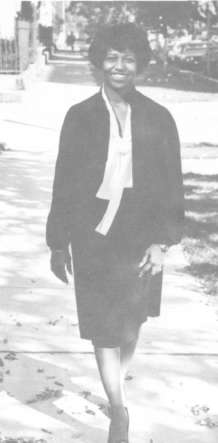
She was one of several key legislators in hammering out a compromise that eventually resulted in state aid for the financially ailing Cook County Hospital. And in a particularly gutsy move, she took on former Law Enforcement Director Daniel K. Webb on the editorial pages of the Chicago Sun-Times. Braun charged Webb in an open letter of reneging on an earlier pledge to increase minority hiring in his agency. Webb fired back a week later — also in the Sun-Times — and tried to repudiate the charges with hiring figures. Right or wrong, Braun's letter hit a nerve and stirred up so much controversy that minority hiring in that agency — and others like it with budgets scheduled to be heard by the House Appropriations Committee — was, for a while, on the rise. Her struggle against the creation of a massive civil rights agency — backed strongly by fellow black caucus members and supported back home — was a lonely fight. Her objections to the bill on legal grounds, however, eventually were shared by the Chicago Council of Lawyers, and she was then noted for her insight and courage back in the district. Perhaps most significantly, however, Braun has posed new challenges to the House Black Caucus. Since her election 1978, she and fellow freshman Larry Bullock (D., Chicago) have lent the Black Caucus new credibility by their outspoken and often independent stance on issues of concern to the black community — a shift away from the usual rank-and-file stance shared by Chicago's regular organization Democrats. But Braun insists the Black Caucus is only a shadow of what it could be, a view that has put her in direct confrontation with some of the groups' splintered and unofficial leadership. "I most certainly want to see some changes in the Black Caucus," Braun said. "Most members are tied lock, stock and barrel to the Chicago machine. Even when it is not in the interest of the constituents, they do as they're told because they're a team. The critical issue for black legislative leaders this session will be choosing whose side they're on — the Chicago machine or their constituents. For some black legislators, their electorate is not the same as their constituency. Their constituency is City Hall. This is wrong." Braun, whose mother is a medical technician and her father a self-proclaimed socialist who worked as a guard in the Cook County Jail, says she is many things to many people. "My ability to move around the floor as I do and round up votes is a function of being who and what I am," she says. "The nice thing about being black and female and an independent Democrat — and a Christian on top of that — is that I can go to the legislators' prayer breakfasts and pray with the conservative Republicans; go to a Democratic Study Group and be intellectual with the liberals; go to a Conference of Women Legislators meeting and deal with them and then go to a Black Caucus and deal with them. It's wonderful." What's in her future? Braun says she's stopped wondering: "I never aimed to be a lawyer, I never aimed to be a politician. It's just happened this way. But I am confident that if I do what I do in the best way I know how, it's going to lead to something, God willing. "□ January 1981 /Illinois Issues/24 Susan Pierson De Witt THE LADY in the first floor corner office of the Illinois Attorney General's Office — the one who has a floor-to-ceiling view of the Capitol — is disarmingly hospitable. Meeting with her in her office is more like a midday coffee break or a weekend luncheon. But the "girl next door" charm can't hide Susan Pierson De Witt's keen sense of self-assurance, the importance she places on keeping her consumer division in the public eye and her ability to get what she wants — on her own terms. She is the first to admit she possesses an almost obsessive need to achieve but says she probably still would be a partner in a prominent Joliet law firm if her husband were still alive. 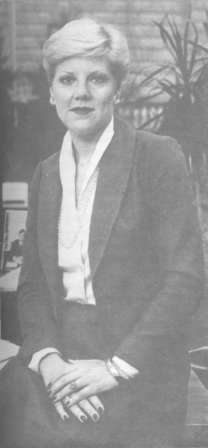
"I had very carefully planned my life up until my husband died about two years after we were married," De Witt says. "The most difficult thing I ever went through was the loss of my husband. We had a real fairy-tale existence until he became ill about 10 months after we were married and began to undergo a bone marrow transplant for an incurable disease. I was not used to having anything go wrong that my father couldn't fix," she recalls. "And all of a sudden, there was something he couldn't fix, something in my life I couldn't control." It was this experience, she said, that eventually convinced her to look beyond Joliet for career challenges. Since becoming chief of the consumer division in 1978, De Witt, 33, has expanded the office and launched new consumer protection programs to put more teeth into efforts by community groups and her office to quash fraud. What do consumers complain about? Automobiles are first, closely followed by home improvement scams. What does De Witt do about these complaints? Her office annually handles more than 30,000 consumer complaints a year (about twice the number of her predecessor) at a savings to consumers of more than $3 million. In the two years before De Witt came, there were 12 consumer lawsuits filed by the office; in the two years since she took over as division chief, there were 42 suits filed. She has also added a half dozen investigators and field workers. De Witt has enlisted the help of the Independent Garage Owners Association in auto complaints. "One of our investigators could not go out and examine an automobile and tell us whether or not the gas tank has actually been pulled and flushed; whereas someone from the garage owners association can take a look at that gas tank and determine whether these are the original bolts from the manufacturer. With their help, repair shops are less apt to call our bluff." In sum, she says, "I've attempted to make the division much more litigation oriented." De Witt is an overachiever, and her lengthy resume and list of awards from various women's groups and civic organizations are proof. Most recently, she was awarded the 1980 International Organization of Women Executives Leadership award.
She also is not afraid to take on stiff challenges. She recalls suing a major drug chain in Illinois. The firm was headed by a close friend of then Atty. Gen. William J. Scott, and one of its directors was former Gov. Richard B. Ogilvie. "I was getting all kinds of telephone calls on this one, but each time I kept insisting the firm was violating state law. Mr. Scott told me to go ahead with the suit. That is the response I like. I believe [current Atty. Gen. Tyrone Fahner] is like this, too. We've got a sticky case coming up and he is backing me all the way." De Witt says her immediate goal is to cut back on the influence of lobbyists in order to get more pro-consumer legislation approved. "We've tried frantically to get more legislation on the auto repair area, and yet we've been fought on every front by the automotive industry," she says. "Lobbyists have a tremendous amount of influence. It's awful." The first woman to practice law in Will County, she was born in Chicago (where her father managed Woolworth Department Stores Inc.) and raised in Joliet. She was graduated from the University of Illinois and John Marshall Law School. Her legal career started in Joliet — as a partner in the firm of O'Brien, Garrison, Berard, Kusta and De Witt and then as special assistant attorney general to manage the Joliet branch of the consumer protection division for then Atty. Gen. Scott. "I've always had the attitude of doing the best at what I do," says De Witt, a woman perceived as a friendly perfectionist by her colleagues and staff in the division. "My interest in consumer law is great, because it gives me the ability to help people. I was making much more money in working for a law firm . . . and yet I was living off other peoples' problems. I get more personal satisfaction in this job I have now, though I still wouldn't mind making a little more money. "I do have ambitions beyond this office, however, but I'm in no hurry right now to leave."□ January 1981 /Illinois Issues/25 Maxene Fernstrom 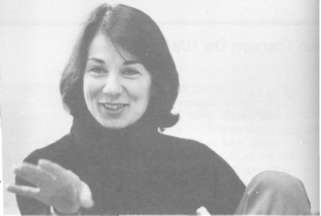 SHE TURNS heads when she bursts into a room wearing a mink coat over a sweatshirt that says, "Ladies Sewing Circle and Terrorist Society." Chicago Sun-Times Political Editor Basil Talbott Jr. once called her "the tiny terror from Wilmette." This woman is Maxene Fernstrom — perhaps one of the strongest and most colorful personalities in Republican party politics. Her list of political clients over the years reads like a Who's Who of Illinois Republican party faithfuls. She was a speech writer and press secretary for former state Comptroller George W. Lindberg, a field organizer and strategist for the GOP National Committee and campaign manager for U.S. Rep. Henry Hyde. She also has worked extensively for U.S. Sen. Charles H. Percy of Illinois and most recently managed Lt. Gov. Dave O'Neal's unsuccessful bid against popular Democrat Alan Dixon for the U.S. Senate seat vacated by Adlai E. Stevenson III. She lives in a huge Wilmette home with her 70-year-old, weight-lifting mother, her sister and her 15-year-old daughter, Kate. Her marriage ended in divorce when Kate was just three years old, but "Max" says her matriarchal family — and her brother, Steven B. Vossteller — have managed to raise her daughter quite well. For Fernstrom, politics is her only love. She says she wants to get the U.S. Senate back into solid control of the Republican party and work to that end in Illinois. "After the 1974 elections, when all of our Republican friends lost, Chuck Percy came up with the idea that there should be a national GOP task force convened to rejuvenate the party, to look at the legislative, statutory and internal changes that could be made. I thought it was a good idea and I was made the executive director of that project in 1975. "That and my whole tenure with the national committee really convinced me that if we really were talking about picking up nine or ten seats for Senate control that it was probably a good investment to have people like me spend 100 percent of the time working on one good race," she said. "I have consistently felt the Senate will make a difference, particularly if we have control of the White House. Republicans have found themselves for too long in the position of saying no to things because of their weakness in Congress. I want to help us keep pushing for total control." As long as Fernstrom wants to keep pushing, her friends say she will. Her uphill battle trying to get O'Neal into the upper chamber was a long, difficult haul. "I knew going up against the Democrats' top vote getter, Alan Dixon, wasn't going to be easy, and it wasn't," Fernstrom said. "We were fortunate to get him [O'Neal] past the primary." O'Neal's success in the primary was due in large part to former Illinois Atty. Gen. William J. Scott's misfortune — his federal trial for tax fraud, which ended in a postprimary conviction and finished Scott as a politician. Still, oddsmakers weren't willing to predict an O'Neal primary victory. Fernstrom, as campaign manager, however, used local party organizations, for the first time in local history, to build her campaign. While other GOP candidates were spending their money on buttons and bumper stickers, Fernstrom was using her limited funds to build rapport with county chairmen. She came up with better advertising, too. While highly touted political consultants were forcing ill-fitting images on Peoria Mayor Richard Carver, Fernstrom had O'Neal talk about himself in his own words, eventually producing a John Wayne-like image the downstate sheriff was able to pull off very convincingly. Fernstrom also seeded the campaign with money from right-wing organizations including the conservative Victory Fund, and she used her friendships with liberals Don Rose and Dr. Quentin Young and her connections in right-wing circles to garner funds. Most important, she turned her staff of nine into an orderly team.
"The success of a campaign has much to do with the strength of it," she says. "I like to divide the campaign and the candidacy; the candidacy clearly being the candidate's. My job is to act as a surrogate for that candidacy; all of our jobs come to that. With that kind of agreement, we are free to decide what the candidate shouldn't worry about — like whether he goes to Champaign on Monday or on Friday, whether he should wear a blue shirt on a television spot or a white shirt. "On the other side of the agreement, the candidate must take full responsibility for what he wants to say. Believe it or not, there really are people who want words put into their mouths. I won't do that." Fernstrom denies she told O'Neal everything to do. Yet for Christmas in 1979, she gave her staff T-shirts labeled with their jobs: hers said "Manager" and O'neal's said "Candidate." While O'Neal workers privately referred to her no-nonsense style and often brusque, single-minded personality as giving her a cold demeanor, they respected her discipline and ability to get things done quickly and efficiently. "I am not the best people person in the world," she admits. "I'm a very private person. Someone once said I was like a physician with a closed practice. To have a new friend, someone had to either die or retire." One of her heroes is former GOP National Committee Executive Director Eddie Mahe Jr., who was also a campaign manager for former Texas Gov. John Connally Fernstrom describes Mahe as a brilliant strategist although he is "an Elmer Fudd-like character who speaks with a lisp, has a crew-cut and is the type that would wear a short-sleeved suit." But, says Fernstrom, Mahe taught her her most valuable political lesson: "He said politics is an inherently risky business and you should never be afraid to be wrong. I haven't forgotten that. And no, I'm not afraid. "□ January 1981 /Illinois Issues/26 Dawn Clark Netsch AT 53 years of age, Sen. Dawn Clark Netsch is beyond a doubt, one of the most powerful female politicians in Chicago. She makes no secret about wanting to be governor one day and says she wouldn't mind being Senate president this legislative term. For 14 years, she has been the aristocratic political hustler representing Chicago's independent 13th District, which stretches along the lakefront from the Merchandise Mart to Wrigley Field. Her role as a mediator of Illinois' unruly delegation at last summer's Democratic National Convention in New York City has once more proven her skills as a leader at a time Democrats in this state find themselves amok in divisive bickering. When duty called, the serious-minded Netsch has been known to swing a baseball bat, attend unorthodox fashion shows and generally be able to rise to — or accept with a laugh — the occasion at hand. "I always seem to stick out a little bit, though," says Netsch with a smile, loading a long, black cigarette holder — her trademark — from a silver case. Her deep, theatrical voice, her often piercing, blue eyes and her page-boy hairstyle make her an imposing figure on the Senate floor. Netsch, a tall, articulate woman, has a professorial air and provides a sharp contrast to the tough, street-wise political style of Jane Byrne — both physically and politically. Since the death of the late Mayor Richard J. Daley, Netsch has found herself, "for complex reasons," more involved in the Democratic party — despite her earlier, unflappable devotion to independent politics. Netsch says she fears Jane Byrne's impact on the Democratic party structure in Chicago and statewide. "You cannot go around making either a city or a political party work with that kind of confrontation all the time, and you also cannot keep Democrats elected if you're not going to recognize that there are many Democrats who've never had an opportunity to participate in the ess. I don't think the city [Chicago] will ever be exactly as it was when Daley was alive, but I just don't want that machine stuff to be reestablished." Yet Netsch also views the mayor's explosive style as a catalyst for new alliances among strange political bedfellows. For example, she is the first one to admit there was a large dose of irony in her support last fall for her old nemesis, Sen. Richard M. Daley, the late mayor's son, who was then running for Cook County state's attorney. "We tease one another about it from time to time, but politically this . . . will help keep the party open. The Democratic party's got to have a broader base to survive." From the start, Netsch stood out. She was a woman in a field then thought suited only to a man. She recalls going door-to-door in Cincinnati, where she was born and raised, when she was 14 years old to raise money for the Charterites, the local good government party in that city. She was a forthright, independent Democrat when the late Mayor Daley was at his peak. She is an elegant woman professor in a Senate still largely comprised of wheelers and dealers, farmers and downstate attorneys. She has had soup dumped on her by an irate colleague, has been booed from the Senate floor and has twice found herself, she says, voting against the entire Senate. She remains undaunted. 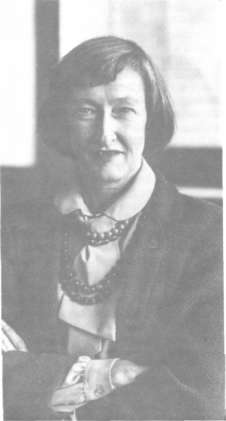
"I love it and I have the feeling if more of us who were serious about the process were willing to take what really is an awful lot of guff for going into politics and government and work at it, then maybe more people would feel better about it [government], and this might make the whole process work a little better." Her cluttered office in the cathedral-like Northwestern University School of Law is a reflection of her diversified interests and frenzied pace. Bookshelves brimming with paperbacks and hardcovers line one wall, a modern art original fills another. On her desk is a copy of The Urban Lawyer, and a pink flyswatter rests haphazardly on a radiator near her spacious windows that overlook East Superior Street on the city's near north side. She has co-authored one of the standard law school textbooks on state and local government and says her office at her unusual Old Town home is similarly cluttered. Netsch even met her husband, Walter, in an unorthodox way. "She wanted to borrow my apartment for a political rally," says Walter, an architect who has designed their home, the chapel at the Air Force Academy and the libraries at Northwestern and the University of Chicago. "I looked at this woman with the cigarette holder and wondered who she was and decided very quickly to let her borrow the apartment." Dawn and Walter were married in 1963. Their home, Dawn says, is filled with Walter's expansive and locally famous modern art collection. "The house is really a big 40-foot cube, most of which is open space, with 35-foot high ceilings, six hi-fi sets and about 10 speakers that go full blast most of the time with classical music." Netsch says she won't leave the General Assembly until either the Equal Rights Amendment passes or until the state has merit selection of judges, a pet project of hers. And she notes with a smile that these goals just might keep her darting between Chicago and Springfield as a legislator-lawyer-professor for some time. January 1981/Illinois Issues/27 Ilana Rovner SHE HAS been called shrewd and glamorous by newsmen and a fairy godmother by some of her employees. But beneath the high society first impression, behind the unguarded giggles and under the broad-rimmed, floppy hats, liana Rovner is sharp, shrewd and knows what it is to suffer. She escaped with her mother from Latvia on a fishing boat in 1939 and left Europe on the last passenger ship to sail to the United States at the outbreak of World War II. She lost most of her family to the war, she says, and her strong committment to public service emerged from that experience. "All through my life, during my early years and up until this day, my parents have drummed into me the fact that 1 had to prove I was worthy of being saved. This, to me, means returning something to society, serving society. It means doing things for people." Rovner is assistant deputy governor, and she says that generally means she steps in to be the governor "when the last person people want to see is me instead of him." One day last summer, when 100 Latinos stormed the governor's Chicago office demanding a boost in public aid dollars, it was up to Rovner to calm them down. "This can happen often," she said. "In this case, these people managed to get to the 20th floor office of interagency cooperation, where they sat on the floor and chanted, 'We Want Thompson.'" Chicago police were called to the scene because of the noise and disruption, but Rovner was able to keep the incident from boiling over into violence by meeting with several Latino leaders of the group and arranged for them to talk with Gov. James R. Thompson by telephone. "Everything I believe in came honestly," she says. "It comes from living. There are some people who suffer and turn it all off. They will never suffer again or suffer for anyone else. But others, having known deprivation, pain and discrimination brought to its ultimate meaning — death — are people who really understand other people's suffering." 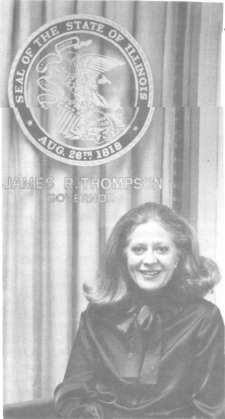
Rovner was born and raised by activist parents in Philadephia. Her father founded the Latvian-American Relief Fund after the war, and Rovner eventually went on to be one of only two women in her law school class at Georgetown University. She met and married Richard Rovner, a world-famous surgeon who heads Northwestern University's seizure disorder clinic; they have a son, Max, age 13. When Max was about four, she went to work as a law clerk for the chief federal judge in the northern district. Her powerful personality caught the eye of James R. Thompson when he was U.S. attorney in Chicago; he hired her, and put her in charge of his unit handling civil rights cases, police brutality, race discrimination, consumer fraud, vote fraud and pornography. It was the first time in the history of the office that a woman held a supervisory post. When Thompson was elected governor in 1976, she was named deputy governor. "Sometimes, even if people don't want to be helped, I help them," Rovner says. "My dad was an opera critic in Latvia, a concert pianist, and when he came to the United States, his first job was sweeping floors in a butter and egg store," she recalls. "He did not have the money at that time to buy a pair of overalls so he swept floors in handmade suits from Europe. I was quite young when I remember asking him how he could bear to do anything so undignified and he said he could for two reasons: first, because he was so grateful to be alive, and second, because he knew he would not sweep floors forever. That, I think, ought to be the way people are permitted to look at things — glad to be alive to be doing, it. and strong in. the knowlege they won't be doing it forever." That stubborn, proud attitude toward public service has often put her in direct confrontation with others. Chicago police marching outside the federal building protesting her efforts to integrate the department aimed their verbal barbs at her. "We were making profound changes that were hitting the very core of the institution of 20,000 men," she remembers. "I survived. You could hear them calling me names all the way up to the 15th floor of the federal building. Each day I'd look out the window and think, oh God, they're back." The resentment toward her was so strong, she says, a police officer moonlighting as a bartender refused to serve her at a party. Years earlier, her parents sent her across Philadelphia to attend an integrated high school, a distance Rovner says was three buses and a subway ride away from her home and an experience that touched her deeply. In college, she was arrested for joining blacks at segregated lunch counters during a demonstration for civil rights. As an attorney in Thompson's office, she used her legal savvy to work toward removing employment and housing barriers for blacks in Chicago.
She says she was a lousy prosecuter — "I was too nice," she laughs — and says her determination has often made some people think of her as "a resident nag." But she practices what she preaches. Her employees are from all walks of life — physically and mentally handicapped, aged, minorities. She calls herself "a 42-year-old kid who doesn't quite know yet what she wants to do when she grows up," yet one might suspect it would most definitely involve public service. "I get down, but I pull myself back up again," she says. "I just won't give up. Failure is impossible to me. Failure equals a type of dying. You don't give up. If you're going to go down, you go down fighting. "□ January 1981 /Illinois Issues/28 Paula Wolff 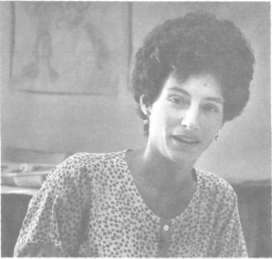 THERE ARE some people, says Paula Wolff, who look at life as something to enjoy and there are others for whom life is a constant struggle. Wolff says she enjoys life — as a matter of principle. She is the proverbial whiz kid without the professorial trappings of her trade; her easy smile and unruffled demeanor bely her no-nonsense education background via Smith College and the University of Chicago. She has a Ph.D. in political theory, public administration, legal history and constitutional law, but somewhere along the line, Wolff also learned to play politics and speak the rough-and-tumble language of compromise. "I think there's generally a feeling that women aren't supposed to be tough, aren't supposed to know how to wheel and deal with the best of them, a feeling that women don't care or need to know about the back room stuff. But you have to or you can't succeed." Wolff, 35, has been a key figure in Gov. James R. Thompson's administration. She was asked to screen candidates for cabinet posts before Thompson first took office in 1977, and she now considers her recruiting skills one of her most important contributions to the Thompson administration. As Thompson's $40,000-per-year program director, Wolff is in charge of 10 special assistants to Thompson; she chairs sub-cabinet meetings and is chief of Thompson's brain trust on formation of policy positions. Gently determined and confident, Wolff is unflappable. She says her proudest moments have been her most controversial. Her efforts last year to put several civil rights agencies under one state governmental roof caused one black House member to bitterly denounce her efforts and call her "the great white mother." She was termed "crazy" by more than one leading Illinois businessman for her struggle to combine three massive pro-business and pro-job development agencies under one superagency -the Department of Commerce and Community Affairs. That agency is still the subject of bristling criticism by those inside — and outside — state government. The new nuclear agency also is a product of hers, and it, too, has come under criticism from skeptics. "All of this reorganization, while disruptive in the beginning, will work out as the problems of growing pains are straightened out," she says. "All of this will streamline government and make it a bit more efficient." "There needs to be a force in government analyzing what it does substantively — not just in the context of the budget, not just in the context of management of agencies — but against some kind of abstract goal. We must make an attempt to deal with honest-to-god problems and do so not necessarily in a flashy or expensive way but in a way that meets the requirements of the people out there." Wolff attributes her choice in a career to her father, who manages a large, corporate law firm in New York. "I came home my junior year from college and I had been doing very well. And everybody was saying I could go do what I wanted after I got out of school," Wolff recalls. "I asked my father, 'Do you have any women lawyers in your firm?' And he said — with a look of absolute amazement on his face — 'Oh no, we can't have women lawyers. We're a service profession. We have to send people out to our clients, and they would never accept women.' I'm not even sure I consciously was aware that I was asking him if I could be a lawyer, but the answer was absolutely definitive." She went back to school.
After receiving her M.A. from the University of Chicago, she went to work part-time for the Illinois Bureau of the Budget and in 1970, became former Illinois Gov. Richard Ogilvie's adviser to the 1970 Constitutional Convention. Once in academe, Wolff lectured at Northern Illinois University in public administration and from 1972-1976, was a tenured professor of public policy at Governors State University. In 1976, Thompson tapped her for his administration. "The turning point in my life, I suppose, was being psychologically pre-disposed not to write my Ph.D. dissertation," she recalls. "I had, by then, figured out that all the theories that I had read about and learned about, while useful, were not where things were happening. "Figuring out what to do and how to do it in government was really the driving force behind my current involvement. There are a lot of inexplicable things out of the direct control of most people, things that must be dealt with by government. How one deals with them can really change things. Once being exposed to that, I was just pulled into the practice of government rather than the study of it. There was just no way the study of government itself was enough to understand what made things work." While Wolff predicts taxes and energy will be the governmental issues of the 1980's, her own personal challenges of the decade, she says, wiil be balancing her frenetic career pace with her role as mother of three girls. Antonia, her youngest daughter, was timed to be delivered roughly two years ago last fall — between the general election and Thompson's second inauguration — "so that I would not have to take too much time off and because I knew it would be a slow period." Her husband, Wayne W. Whalen, is one of Chicago's most prominent lawyers. "As long as you're holding a job as a woman, life is not simple," she says. "I get up and leave meetings when my airplane leaves to go [home] to Chicago, when I know I should stay in Springfield and trail my profession. But the euphoria of my kids as I come marching in the door is something I'll never sacrifice. "The reality is that I get an awful lot of pleasure out of what I do and while the sacrifices aren't easy, so far, it's worked." When asked about her future — specifically with the Thompson administration — she said, "I have a time horizon that's just about 45 minutes long," and laughed, "but he's said he wants to be president some day, and as long as he'll have me, I'll go with him." January 1981/Illinois Issues/29 |
|
|